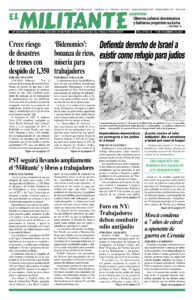MONTREAL — “We don’t have enough resources to teach the students. This demonstration shows how urgent this is. We also need a real wage increase because of inflation,” striking teacher Joseph Dejustima told this Militant worker-correspondent at the start of a march of tens of thousands of teachers and education workers on Nov. 23, the first day of an unlimited strike by their union, the Autonomous Education Federation (FAE).
The FAE strikers were joined on picket lines and in demonstrations that day by another half million Quebec public-sector workers — the big majority women. This included the 420,000-strong Common Front of four union federations and 80,000 nurses from the Interprofessional Health Federation of Quebec (FIQ).
On Nov. 28 the Common Front called for a weeklong strike Dec. 8-14. Together with the FAE strike, this will shut down public offices and services across Quebec.
The workers are demanding new union contracts that meet their needs, as well as those of students, parents, health care patients and others. Their contracts expired March 31.
Many strikers and union officials describe the mobilization as historic in its size and impact throughout Quebec.
Negotiations between the Common Front and the Quebec government are currently being conducted through a government-appointed conciliator. Union officials have not yet announced further actions. But if the government does not come up with an offer worth considering, the Common Front could join the FAE in an unlimited strike.
The Common Front is demanding wage increases above inflation in a three-year contract, with the 2023 increase equivalent to the Consumer Price Index plus 2%, or an increase of 100 Canadian dollars ($74) a week, whichever is higher. They are also demanding cost-of-living protection.
Entry-level wages for nurses in Quebec are the lowest in Canada, 40% below those in Ontario. The nurses are demanding an increase of 24% over three years and further increases yearly, indexed to inflation.
“The trades workers earn 30% less than they could in the private sector,” hospital carpenter Daniel Boucher told the Militant Nov. 21 on a picket line at Santa Cabrini hospital in east-end Montreal. “We aren’t dumb. Government officials gave themselves a wage increase of 30%. We’re ready to strike for a long time.”
Last spring the government voted to give elected members of the Quebec National Assembly a CA$30,000 one-year salary increase, and a CA$60,000 salary increase for Quebec Premier Francois Legault.
Broad working-class solidarity
There is broad working-class support for the struggle of the public-sector workers. Most people know someone who is or was on strike and marched Nov. 23.
“I went by six picket lines on my way to work” at the Bridor industrial bakery, Jean Francois Leonard, a member of Local 55 of the Bakery, Confectionery, Tobacco Workers and Grain Millers union, told co-worker and Militant correspondent Katy LeRougetel.
“You only had to walk a few hundred meters to feel the support of the population behind the workers,” the Journal de Montreal reported Nov. 23. “While the drivers honked their horns to make themselves heard, the neighbors and the shopkeepers on St. Laurent Boulevard came out by the dozens to support the strikers.”
This kind of broad working-class solidarity was pivotal in the victory of 55,000 unionized Ontario education support workers in November 2022, when they forced the Ontario government to withdraw its draconian Law 28 that eliminated their right to strike.
Unions across Ontario and elsewhere supported the workers. The Ontario Federation of Labour threatened a general strike. Last spring working-class solidarity also helped 155,000 federal public-sector workers, members of the Public Service Alliance of Canada, who carried out a militant national strike, to make gains.
Today’s fight takes place as the capitalist system in Canada goes into a deeper crisis, spurring an uptick in working-class resistance through the unions.
Building solidarity with the struggle of the FAE, FIQ and the Common Front is needed now. The Ontario section of the Canadian Union of Public Employees, the Ontario education workers’ union, set an example with a Nov. 6 declaration of solidarity with the Quebec Common Front struggle.

